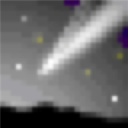Solar System Scope Alternatives

Solar System Scope
3D simulation of the Solar System and night sky - real time virtual orrery and observatory
Features:
- Heliocentric view with real-time positions of planets and planetary orbits
- Schematic and realistic sizes of the planets and distances between them
- Movement of the planets in time to see how they move in relation to each other - Virtual Orrery
- Planetary exploration with info texts, images and additional views such as structure
- Moons (Galilean moons, Deimos & Phobos, Titan and 15 others)
- Dwarf planets (Pluto, Ceres, Haumea, Makemake. Eris) and their orbits
- Comets (Siding Spring, Lovejoy 2013, Lovejoy 2011, Panstarrs, ISON, Halley, 67P, 209P) - positions and trajectories
- Spacecraft Rosetta and its journey to comet 67P/Churyumov–Gerasimenko
- Stars and constellation of the night sky as viewed from a given location - Virtual Observatory
- Interactive night sky: point the device at the sky to see all objects in their proper place
- Changes in the night sky during night, month and year
- Advanced searching of the objects
- Ecliptic line, grid lines and more
Best Solar System Scope Alternatives for Linux
Hate Solar System Scope? Use another browser! Which one should you go with? Try out these other browsers before making your final decision. Want some more context? We've got a great list of alternatives to Solar System Scope here.

Stellarium
FreeOpen SourceMacWindowsLinuxPortableApps.comStellarium is a free open source planetarium for your computer. It shows a realistic sky in 3D, just like what you see with the naked eye, binoculars or a telescope. It...
Features:
- 3d animation
- Education
- Portable

Celestia
FreeOpen SourceMacWindowsLinuxPortableApps.comCelestia is an application for real-time 3D visualization of space, with a detailed model of the solar system, over 100,000 stars, more than 10,000 galaxies, and an...
Features:
- Simulation
- Portable

KStars
FreeOpen SourceMacWindowsLinuxKDEKStars is a Desktop Planetarium for KDE. It provides an accurate graphical simulation of the night sky, from any location on Earth, at any date and time. The display...

Cartes du Ciel (Skychart)
FreeOpen SourceMacWindowsLinuxThis program enables you to draw sky charts, making use of the data in 16 catalogs of stars and nebulae. In addition the position of planets, asteroids and comets are...

Gaia Sky
FreeOpen SourceMacWindowsLinux3D visualization software for ESA's (European Space Agency) Gaia mission to chart about 1 billion stars of the Milky Way Galaxy.
Features:
- Notifications
- 3d animation
- Education
- Simulation
Upvote Comparison
Interest Trends
Solar System Scope Reviews
Add your reviews & share your experience when using Solar System Scope to the world. Your opinion will be useful to others who are looking for the best Solar System Scope alternatives.